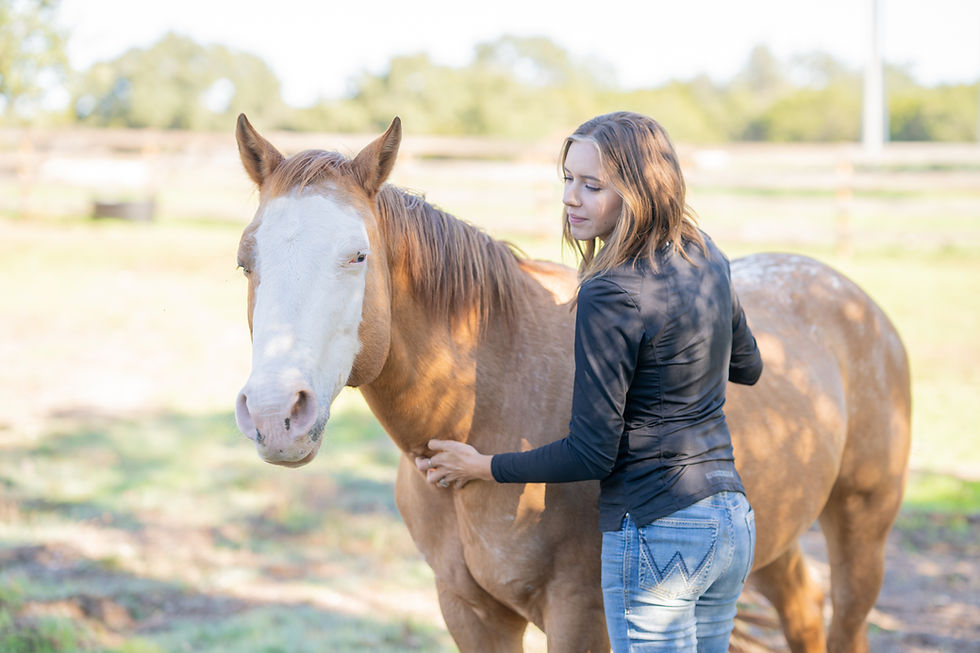Horses Are Too Dangerous
- Adele Shaw
- Feb 3, 2019
- 4 min read

"Horses are too big and dangerous to train with positive reinforcement,
they will kill you."
Does the size of the animal have any impact on the way you should train it? The answer is both yes, and... no. YES, because to a certain extent the size of the animal you are working with dictates the risk factor involved to your own person. If a small mouse bites you, it’s only going to hurt so much. However if a horse bites you is going to hurt a lot more! Of course there are all kinds of other factors that have nothing to do with size to dictate danger level as well though.
A Tiger is technically smaller than a horse, but a whole lot more dangerous to a human. Even smaller still... a large dog can kill a human, it’s happened many a time. And then of course we could go really big, to an elephant, who’s clearly an extremely large and powerful animal, but poses the same risk hazard as a very small venomous snake.. just in a different way.
So obviously size only has so much to do with the situation, but no doubt a horse can be very dangerous compared to a little lap dog, so we clearly need to take precautions when working with animals that pose more risk. NO, because the size of the animal does not dictate how training works and how animals learn. Whether you’re working with a mouse or an elephant the learning and training process is the same. Though they may have differences in temperament, size, natural tendencies, and varying intellectual capabilities depending on the species, this does not impact how they or we learn. Which means, positive reinforcement works regardless of size. Size DOES however impact how easily we can use coercion and force to manipulate an animal to do what we want without risking our own safety too much. For example... a baby elephant is just small enough to man handle into submission through pressure and punishment, while its adult counterpart is far too large to “tame” with such methods so we either have to “break in” the babies so they are manageable (with continued force) as adults. OR... we have to use alternative means of training an adult elephant that do not require force and coercion... Size also dictates how much we can “get away with” in regards to being poor and inconsistent handlers/trainers/owners before it becomes dangerous. Most of us are familiar with the idea that little dogs tend to be “vicious” and “mean”. Most little dog breeds have incredibly long bite records that would put the “dangerous” larger breed dogs to shame... but because of their significantly smaller size they do not pose the same risk as a large breed dog; so we feel comfortable and lax about training small dogs, and as a result they tend to become these miserable little animals spoiled and untrained because of their size. So what does this have to do with horses? Well... everything. Horses are large powerful animals, so their size alone poses a threat to humans, but they are not nearly so aggressive by nature as let’s say a lion or bear that we fear them or feel threatened by their presence. They are not so big that they can’t be physically manipulated and controlled by force, but they are just large enough that we have to do SOMETHING if we are going to live with them and keep them; they can’t just be spoiled miserable "lap dogs".
This leaves us in a very unique place, a place not unlike where most large dog owners find themselves. We HAVE to establish some level of safety for ourselves and other humans when we have these animals in your lives. We HAVE to stop dangerous behaviors and train them to be a “good citizen”, for both selfish and selfless purposes. But how? Traditionally we've used force and fear based methods to "put the fear of God" into our horses. To step into the pen with them and show them what's what. Since they are just small enough and passive enough to be able to do this with.. it's undoubtedly the fastest and the easiest way. Quick results and the human is in charge; just the way we like it. But then there are those horses that are too sensitive, too scared, or too resistant to break easily .. they break the mold on how horses typically respond to training, becoming highly aggressive or explosive and unpredictable. The normally "passive" nature that allows us to get away with pressure and punishment based training methods is suddenly outweighed by their powerful and large size. We are faced with the options of changing what we are doing or giving up entirely. Thankfully, we have the option of changing.... If we can teach much larger and much more dangerous animals without force and coercion, and with great success, without putting ourselves at risk, we can certainly train horses differently without risking ourselves. Horses are not too large that the rules of training and learning don't apply to them They are not too dangerous that we HAVE to use punishment and pressure to keep ourselves safe. They don't learn in some unique way that prevents us from using kinder methods. Horses are no different from a dog, a mouse, a tiger, an elephant, a dolphin, or a lizzard! You just have to be willing to see that and to make the changes necessary.
photo credit ; danielle vargo photography
- Adele




